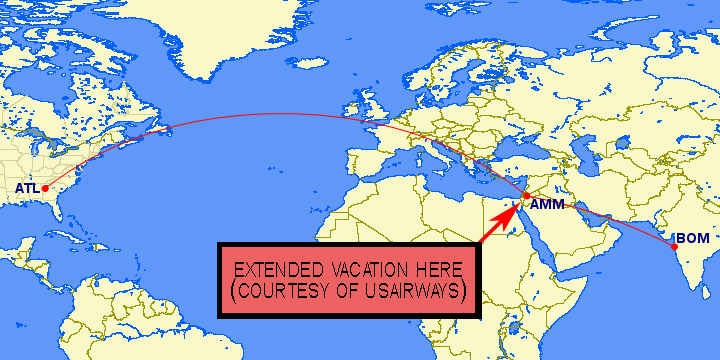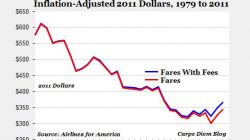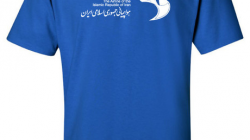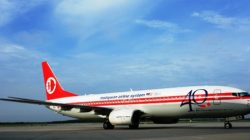From the desk of the Devil’s Advocate…
This might be the most challenging column I’ve written to date. I’m taking on a Herculean task that may very well prove impossible. I’m going to argue a position that’s more controversial and may cause more reader angst than any stance I’ve taken to date…
Today I’m going to attempt to prove that Christopher Elliott is right.
No, not about hating loyalty programs. I have no idea why Chris, as a consumer advocate, is so fascinated with bashing all of us who have successfully turned airline and hotel loyalty programs to our advantage. It would seem in his mind we’re “working” the system in ways that either he doesn’t approve of or can’t figure out. But by all means, I hope he goes right on advocating against miles and points programs. It just leaves more open award space for the rest of us.
Let me also note that a few years ago Scott took on a similar challenge in a post where Chris had been complaining about entitled elite travelers and Scott tended to agree with him. So I’m not the first to venture into this territory, though I think we can all agree that no one particularly likes or admires the entitled elite traveler.
But this past Tuesday Chris wrote about how skeptical he is when it comes to airline alliances. He says they’re anti-competitive, that they give airlines the opportunity to collude with each other. He believes that airline alliances in general are bad for consumers.
Now, I think it’s safe to say that the Conventional Wisdom in our little miles and points community is that this position is idiotic. How can airline alliances be so awful when they allow us access to a huge additional swath of carriers, routes, and premium cabins that we would otherwise have no way of obtaining? Or the flexibility to credit earned miles to loyalty programs that might differ from the actual airlines we’re sometimes stuck flying due to schedule and/or work constraints?
Well, let’s take a look at Chris’ argument. We might just find he has a few good points.
Maybe.
Alliances are great for miles, but what about cash tickets?
Why don’t we start with Chris’ general claim that alliances allow airlines to collude with each other? Now, Chris didn’t provide any actual evidence for that claim, but to be fair, his post wasn’t focused on that particular aspect of alliances. Also, this is the Internet. Based on law and international treaty, we’re allowed and encouraged to make blanket statements without any proof whatsoever. It’s true. Look it up on the Internet.

Since we don’t have hard evidence, let’s instead consider his claim in the abstract. The Department of Transportation grants limited antitrust immunity to airline alliances to allow them to operate. Theoretically, this immunity could give airlines the opportunity to work out amongst themselves who would fly where and when, carefully parceling out the world route-by-route to keep competition to a minimum.
For instance, British Airways and American could hypothetically agree that BA would exclusively run the JFK-Heathrow route while American takes LAX-Heathrow. They would each codeshare those routes under their oneworld alliance, thereby minimizing operating costs and maximizing profits.
That’s an extreme example which obviously isn’t happening, plus the limited immunity granted by the DOT most certainly wouldn’t allow such unambiguous monopolistic activity. But a more subtle and limited version of that is what I think Chris is talking about (and since he didn’t explain himself, we get to decide what he meant).
In any case, it’s basic economic theory that having fewer players control more of the market eventually leads to higher prices for consumers, which makes alliances good for airlines and bad for consumers. His logic does hold.
So at least in theory, Chris is right.
What about in practice?
Well, for miles redemptions, carriers in the same alliance are often all over the place when it comes to their award charts and procedures. British Airways charges 4,500 miles for a one-way flight from LAX to SFO, while American charges 12,500 miles for the same route. Yet their alliance allows consumers to take advantage of the lower price instead of being forced to use the higher one. On the flip side, British Airways insists on adding fuel surcharges to redemptions on their planes, while American doesn’t. That makes a flight from NYC to Heathrow cost a similar number of miles on both carriers, but a lot more cash if you do it on British Airways.
Clearly we see there’s evidence of continued competition when it comes to the miles side of the equation (yes, that example was just anecdotal, but remember: the Internet). However, Chris is likely talking about cash prices. Are cash prices higher because of alliances?
The answer is… sometimes.
There’s substantial research on this very question, and the answer you get is extremely dependent on what market you’re looking at and how you’re looking at it. In one study this past July, researchers found that codesharing agreements increased flight frequency, which had a positive impact on supply. A different study a few months earlier concluded that the presence of an alliance in a given market increased prices by around 9% on average. Yet another study demonstrated that alliances had zero net effect on the incentive for interhub collusion.
Even if the evidence is mixed, I think it’s fair to say that Chris is making a potentially valid point. At the very least, the idea isn’t crazy. Let’s score this one in Chris’ favor.
Who the heck is in charge here?
Let’s dive into the problem Chris was addressing in his Tuesday post. Apparently he had been contacted by one of his readers who was trying to deal with a nasty schedule change. The reader used US Airways miles to book flights on Royal Jordanian (his routing was ATL-AMM-BOM), and when Royal Jordanian cancelled the AMM-BOM leg and rescheduled him for a flight two days later, neither US Airways nor Royal Jordanian was being particularly helpful in coming up with a solution that didn’t require a multi-night stay in Amman.

Now, all of us here in the points and miles community understand this issue, and for the experienced loyalty program user, several options immediately spring to mind. The most obvious one is that since this is US Airways, just keep calling back until you find someone who will help you. Eventually you’ll land on an agent who is either nice enough or clueless enough to fix the problem.
Another option would be to find another oneworld routing from Atlanta to Bombay with available award inventory. The reader says he asked US Airways to do just that but they didn’t help him. Again, those of us in the know can instantly see the reader’s mistake — don’t rely on the agent to find the alternate routing. Find the availability yourself and then call.
Then when we get deeper into the reader’s story, we discover his original itinerary had him already spending one night in Amman. Though Royal Jordanian wasn’t willing to cover a multi-night stay, as a business class passenger they had originally agreed to cover his hotel expenses for the one night.
Wow. Really? You’re telling me that Royal Jordanian was going to cough up money for a hotel room for a booking made using US Airways miles? That sounds awfully generous to me. Seems like a pretty sweet reason to have airline alliances, right? Yaaaay airline alliances!
Wait a minute… I forgot I’m supposed to be arguing in Chris’ favor. Sorry. I told you this wasn’t going to be easy.
OK, well, Chris’ point is that when the schedule change happened, both US Airways and Royal Jordanian pointed the finger at the other and the reader had nowhere to go for a solution. That’s a wholly valid complaint.
We’ve all heard these stories before and some of us can attest to it happening personally to them. One of the big drawbacks of using miles on alliance partners is that if the situation goes bad, it can be very difficult to find someone who will take responsibility for fixing it.
Is that a reason not to have airline alliances? Instead of getting rid of alliances, wouldn’t it be better to simply have a standard procedure in place for alliance members to solve problems when scheduling changes and IRROP situations occur? I think most of us other than Chris would agree that would be the preferable route.
But as far as Chris’ argument goes, yes, difficulties in dealing with multiple carriers are a definite downside of alliances. I may not agree with his prescription to remedy it, but I do agree it’s a problem.

Are miles travelers second class citizens?
Chris’ reader states in his complaint that it seems passengers who redeem miles are second class citizens. I’m not quite sure what that has to do with airline alliances, but Chris agrees with the reader that he’s not being unreasonable in expecting US Airways and/or Royal Jordanian to either reroute him or compensate him for his hotel expenses.
I agree with both of them on this one… to a degree.
Mileage travelers should certainly be treated the same way as those traveling on cash tickets when it comes to schedule changes and irregular operations, and in this case it’s not at all unreasonable to expect US Airways to do a much better job of arranging alternate flights or accomodations for their customer.
However, bad customer service is an unfortunate hallmark of airlines, especially the ones right here in the good ol’ USA. Even with cash tickets, there’s plenty of horror stories of airlines who simply didn’t make much of an effort to either communicate or solve an issue when problems occurred, as they inevitably do. It doesn’t necessarily have anything to do with the fact that one is using miles to travel — we’re just often stuck with lousy customer service in the travel industry.
And helping folks who run up against lousy customer service is the exact job description of a consumer advocate, isn’t it?
The Devil’s Advocate agrees that airline alliances aren’t perfect, but…
Chris is correct that alliances aren’t the holy grail of travel. In an endeavor as complex as coordinating a dozen airline systems and cultures, there’s always going to be issues. If the airlines want to claim to have “seamless” alliances, they should do their best to actually have them, and to work proactively to solve problems that occur when they aren’t in fact seamless.
But it’s tough to agree with Chris that alliances are inherently bad. From a mileage perspective, they open up all sorts of options to travelers. Even in this particular case, Chris’ reader only had the ability to use US Airways miles to fly to Bombay because of the oneworld alliance. Otherwise he wouldn’t even have the option. Even if he gets stuck having to pay for a few nights in Amman, he’s saving thousands of dollars in airline tickets in the first place. That’s not too shabby.
So hopefully he has some flexibility in his travel plans and can still make his trip work. And hopefully, there’s some flexibility in Chris’ thinking on alliances too.
Devil’s Advocate is a weekly series that deliberately argues a contrarian view on travel and loyalty programs. Sometimes the Devil’s Advocate truly believes in the counterargument. Other times he takes the opposing position just to see if the original argument holds water. But his main objective is to engage in friendly debate with the miles and points community to determine if today’s conventional wisdom is valid. You can suggest future topics by sending an email to dvlsadvcate@gmail.com.



